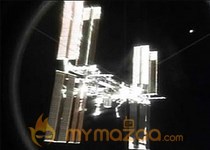Three astronauts returned safely to Earth from the International Space Station on Friday aboard a Soviet-era capsule whose mission follows an unprecedented spate of Russian space accidents.
Space officials said the Soyuz TMA-21 capsule landed on its side in the wind-swept steppes of the ex-Soviet republic of Kazakhstan at 0400 GMT.
"A bulls-eye landing for the Soyuz TMA-21," a NASA commentator said in a live video feed while Russian mission control flashed a message on its screen reading: "Landing confirmed!"
A smiling but weary commander Alexander Samokutyaye was later shown being carried out of the capsule in the arms of rescue Kazakh workers under a dazzling blue sky.
The two Russians and their NASA counterpart had earlier said heartfelt goodbyes to their three colleagues on board the station following an eventful mission that at one stage saw them mulling the possibility of a forced evacuation.
"It was great sharing space with you," the next mission's commander Mike Fossum told the departing crew as they started their journey home over northern China.
The Soviet-era vessel left behind a skeleton crew of three -- NASA's Fossum and Russia's Sergei Volkov along with Japanese flight engineer Satoshi Furukawa - on board the orbiter at one of the tensest times in its storied history.
Russia kicked off the $100 billion international project's construction in 1998 in the midst of a heated race with the United States for space supremacy in the early post-Soviet era.
But the programme has recently suffered an embarrassing series of setbacks that saw sensitive satellites fail to reach orbit and -- in the most dramatic accident last month -- an ISS cargo craft crash back to Earth.
The August 24 accident prompted Russia to temporarily ground a part of its Soyuz programme while it conducted emergency checks.
Various versions of the Soyuz rocket are used to ferry both cargo ships and fresh crews to space. Its re-entry vessels remained docked to the station during missions and then used by crews to return to home.
This low-cost simplicity has been Russia's pride and has made the Soyuz especially indispensable since the July retirement of the US space shuttle programme.
NASA had been mulling the option of leaving the space station abandoned for the first time in 10 years should Roskosmos fail to solve its problems by mid-November.
The Russian agency this week scheduled the next manned Soyuz mission for November 12 - just days before NASA's final deadline.
This will force a quick handover of command from the team now on board as it prepares to head home on November 22. NASA rules require a quick rotations of crews because Soyuz capsules are only certified for six and a half months. (AFP)







